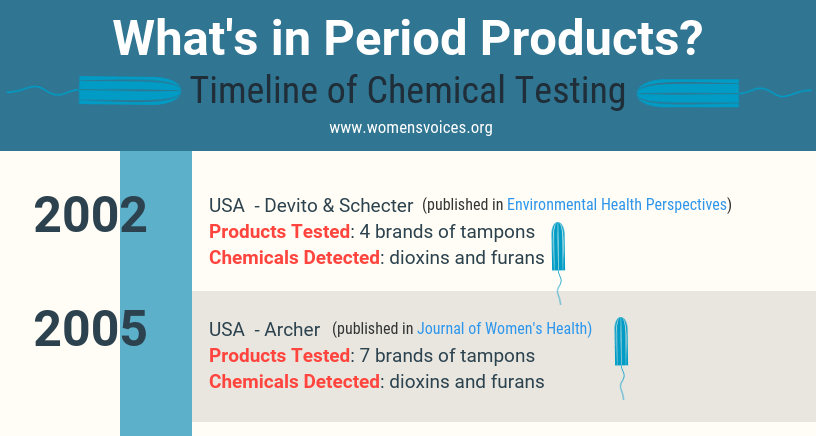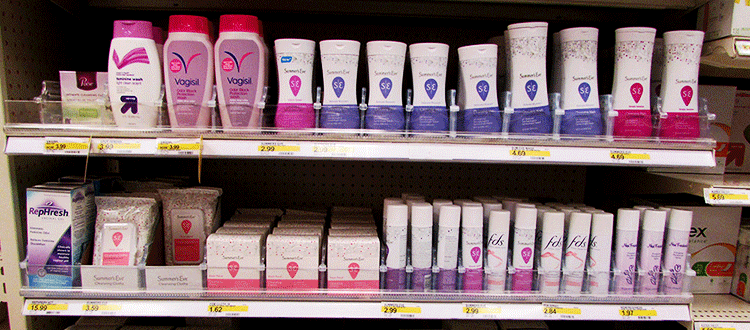Study Finds Vaginal Douching Associated with Higher Phthalate Levels
Francesca Branch, Tracey J. Woodruff, Susanna D. Mitro and Ami R. Zota (2015) Vaginal douching and racial/ethnic disparities in phthalates exposures among reproductive-aged women: National Health and Nutrition Examination Survey 2001-2004. Environmental Health. Vol.14. No. 57, July, 15 2015.
Whether you use vaginal douching products or not, this important first-of-its-kind study reaffirms the need for more research into this unique and sensitive route of exposure for women.
What was the study all about?
The study aimed to understand whether vaginal douching products and other feminine care products affect levels of phthalates in women’s bodies — and to investigate if douching behavior can explain why black women have higher levels of phthalates than women of other races and ethnicities.
The study, published in Environmental Health in July 2015, used data from a national health survey conducted by the US Centers for Disease Control and Prevention (NHANES) to investigate the levels of phthalates in the urine of American women who reported using vaginal douching products and compared those levels to non-users. The survey conducted in 2001-2004 asked over 700 women how often they used vaginal douches. The survey also measured the levels of phthalate break-down products or metabolites in the urine of those same women. The levels of phthalate metabolites in urine reflect the levels to which a person’s body has been exposed to phthalates, which are chemicals of concern for human health.
What did the study find?
The practice of douching is associated with higher levels of phthalates in women’s bodies. The more prevalent use of vaginal douching products by black women can partially explain why black women have higher phthalate levels than women of other races and ethnicities.
Women who reported using vaginal douching products had higher levels of metabolites of diethyl phthalate (DEP) in their urine. More frequent use of douches (i.e. twice per month or more) was associated with even higher levels of phthalates found in their bodies.
The study also found a significant racial difference. The survey found that black women had phthalate levels that were 48% higher than those in white women. Black women were also much more likely than white or Mexican- American women to report that they douched regularly. This study found that the higher levels of phthalates in black women could be partially explained by the greater frequency of douching by black women, compared to women of other races and ethnicities.
Why is this study important?
This study is the first of its kind to demonstrate that feminine care products can expose women to harmful chemicals. The study also sheds light for the first time on why black women may have higher levels of phthalates than women of other races and ethnicities.
This study is the first of its kind to demonstrate that feminine care products can expose women to harmful chemicals. Previous studies have linked daily use of personal care products such as perfumes and lotions to higher levels of phthalates in womeni. This is the first study to demonstrate a similar effect from a feminine care product applied vaginally.
The reasons for the significantly higher levels of phthalates found in black women’s bodies compared to women of other races and ethnicities have — until recently — been largely unexplained. This study indicates that some of the difference in the levels of phthalates may well be attributed to the practice of douching.
Phthalates: Chemicals of Concern
Phthalates are chemicals of concern for women’s health because they are endocrine disruptors and are linked to harmful health effects including reproductive and developmental harm as well as chronic disease risks in adults. They are also thought to be particularly harmful when a developing fetus is exposed in the womb. Specifically, women’s higher exposures to DEP during pregnancy have been linked to adverse developmental outcomes in their children.ii,iii
Phthalates are also problematic as they are difficult to avoid in personal care products. Phthalates are common components of fragrances. Unfortunately due to current law, companies are legally allowed to keep fragrance ingredients a secret from consumers. One usually finds only the word “fragrance” on the label, without further information as to whether that fragrance contains phthalates of other fragrance chemicals of concern.
I don’t douche. How is this study important for my health?
This first-of-a-kind study addresses the health impact of chemicals found in feminine care products that are applied vaginally. This study reaffirms the need for more research into this unique and sensitive route of exposure for women.
Unfortunately, very little medical research exists that investigates the impacts to a woman’s body when they are exposed to toxic chemicals vaginally. This study looked at associations between phthalates and six different types of feminine hygiene products, including tampons, sanitary napkins and wipes and sprays, but only found a link with vaginal douches. However, feminine care products contain other chemicals of concern and there has been very little research on the health impacts of exposure.
What can you do to protect your health?
- Reduce or eliminate use of feminine care products which may contain phthalates or other chemicals of concern. The American College of Obstetricians and Gynecologists specifically recommend against the use of douches, as well as feminine care products containing fragrance such as tampons, pads, feminine sprays and powders.iv,v
- Choose unscented personal care products, where available.
- Visit www.womensvoices.org to learn more about how to avoid chemicals of concern found in feminine care products.
- Join the Detox the Box Campaign at www.womensvoices.org and use your voice to demand that manufacturers of feminine care products fully disclose all ingredients including fragrance chemicals!
- Ask your Congressional Representatives to support policies that would require more research into the impact ingredients in feminine care products may be having on women’s health.
———————————————–
iJoe M. Braun, Allan C. Just, Paige L. Williams, Kristen W. Smith, Antonia M. Calafat, and Russ Hauser (2014) Personal care product use and urinary phthalate metabolite and paraben concentrations during pregnancy among women from a fertility clinic. Journal of Exposure Science and Environmental Epidemiology. 24(5): 459–466. September 2014.
iiSwan SH, Main KM, Liu F, Stewart SL, Kruse RL, Calafat AM, et al. (2005) Decrease in anogenital distance among male infants with prenatal phthalate exposure. Environmental Health Perspectives. 2005;113(8):1056–61.
iiiEngel SM, Miodovnik A, Canfield RL, Zhu C, Silva MJ, Calafat AM, et al. (2010) Prenatal phthalate exposure is associated with childhood behavior and executive functioning. Environmental Health Perspectives. 2010;118(4):565–71
ivAmerican College of Obstetricians and Gynecologists (2011) Frequently Asked Questions: Pelvic Inflammatory Disease. FAQ077. May 2011.
vAmerican College of Obstetricians and Gynecologists (2011) Frequently Asked Questions: Disorders of the Vulva.FAQ088. July 2013.






